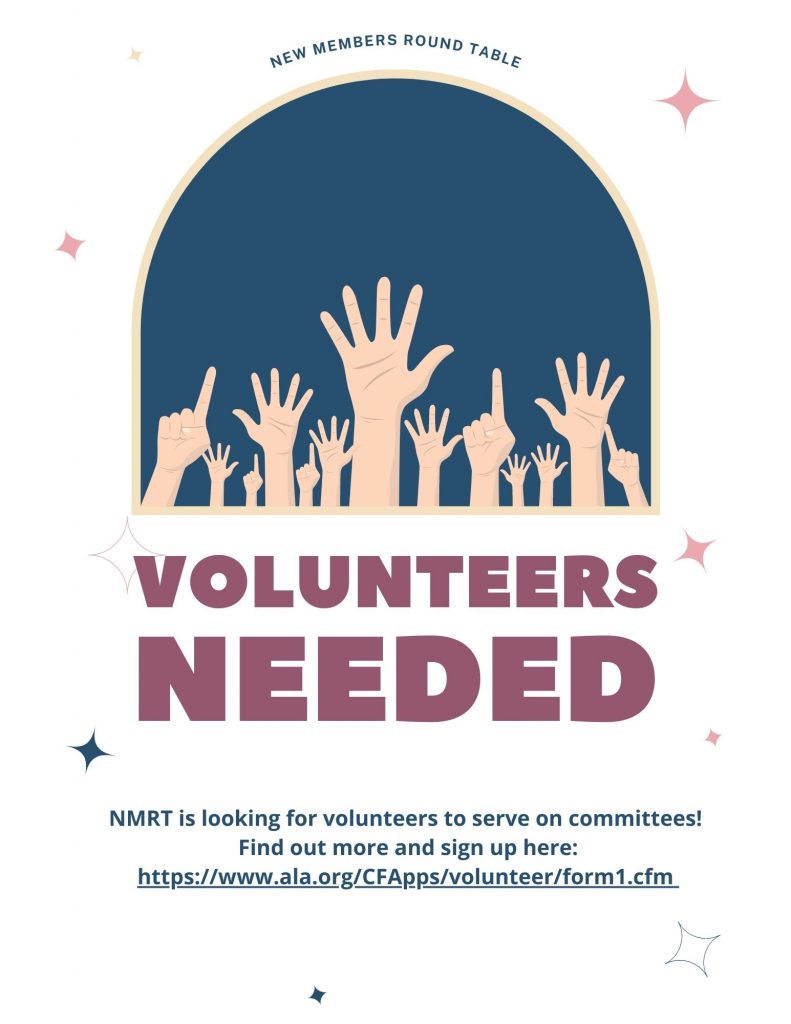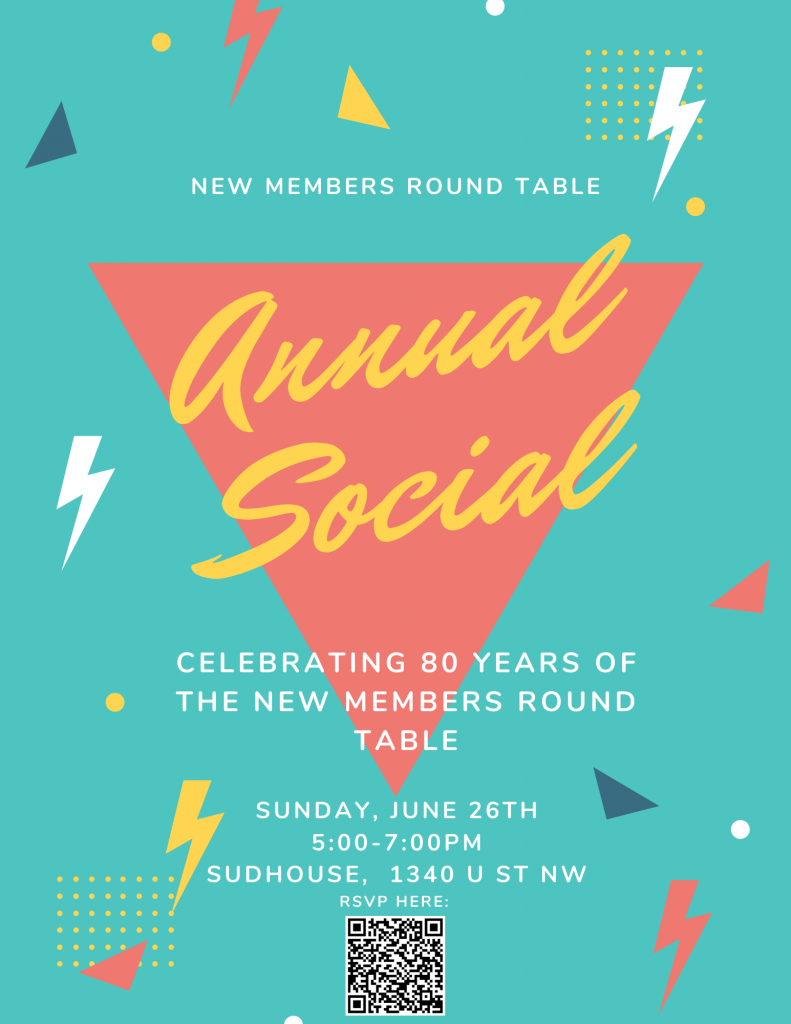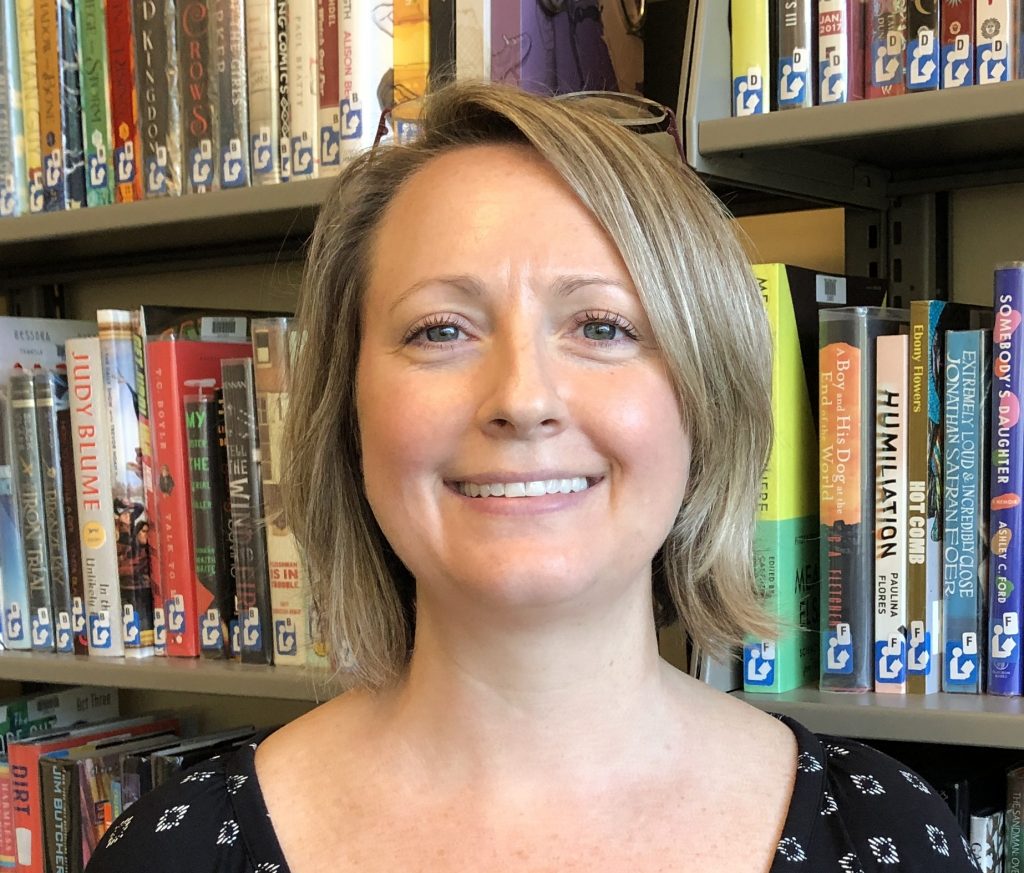Find out more about NMRT committees and sign up at this link: https://www.ala.org/CFApps/volunteer/form1.cfm

Find out more about NMRT committees and sign up at this link: https://www.ala.org/CFApps/volunteer/form1.cfm

Mark your calendar! Less than 1 week until NMRT President’s Program: Finding Your Way in Library Land. Join us on Saturday, June 25 at 11:00am – 12:00pm in the Washington Convention Center, Rooms 159A-B.
The 2022 NMRT Local Information Committee created a Google Map for members to find restaurants and points of interest during the ALA Annual Conference in DC. You can click on a blue point/circle to learn information about each point of interest.
https://www.google.com/maps/d/embed?mid=15_folHaU9dV7HpGA6sOLojMeWMKMWpPF&ehbc=2E312F
NMRT is looking for committee volunteers! Committee appointments last for one year, beginning at ALA Annual (June/July) and ending at the next ALA Annual Conference. You must be a dues paying member of NMRT to serve on a committee.
If you’re interested, please complete the form at this link so that we may capture your interest and assign you to the appropriate committee. https://www.ala.org/rt/nmrt/nmrt-committee-volunteer-form
The NMRT Annual Conference Professional Development Attendance Award Committee is thrilled to announce the award winners for 2022!
In the spirit of ALA’s New Members Round Table (NMRT), this award fosters active involvement in ALA through various special events at the Annual Conference. The Annual Conference Professional Development Attendance Award is presented to two NMRT members each year. The award provides professional development and networking opportunities to NMRT members by providing a ticket to attend any ticketed event of their choice.
Addie R. Holloman
Addie R. Holloman (she/her) is a Library Services Assistant at Roanoke Chowan Community College, in Ahoskie North Carolina. She has received a degree in Business Administration/Market, and certificates in Accounting, and Library Management. Enrolled at Central Carolina Community College, Addie is majoring in Library Information and Technology and is a member of Phi Beta Kappa. (an alternative student majoring in Library and Information Technology, already has received. Some of her memberships include Phi Beta Kappa (PKT), American Library Association (ALA), New Member Roundtable (NMRT), North Carolina Community College Library Association (NCCCLA, North Carolina Library Association (NCLA), North Carolina Library Paraprofessional Association (NCLPA), Round Table for Ethnic Minority Concerns (REMCo), Leadership, Administration & Management (LAMS), Business Librarianship in North Carolina (BLINC), Association of College and Research Libraries-North Carolina Chapter (ACRLNC), Community & Junior College Libraries Section, and Film and Media Round Table (FMRT).
Addie R. Holloman will attend the 53rd Annual Coretta Scott King Book Awards Breakfast as her selected ticketed event.
Kristy Browning
Kristy Browning is the Business Manager at the Cabell County Public Library (CCPL) in Huntington, WV, and a first-year MLIS student at Louisiana State University (LSU). She has worked at CCPL for 11 years and hopes to remain in public libraries in some capacity for many years to come. Kristy handles accounts payable, accounts receivable, and payroll for six library systems and has managed the funding for the construction of two new branch libraries as Business Manager at CCPL. Kristy has earned Library Financial Management Certification from the Carl Vinson Institute of Governmental Accounting at the University of Georgia. She is the 2022 recipient of the SLIS Frank & Margaret McAfee Travel Award Fellowship at LSU for travel to the 2022 ALA Conference. Kristy enjoys knitting, reading, and visiting local craft breweries with her husband in her free time. She also has two dogs, Franklin & Eleanor, and a cat named Betty.
Kristy Browning will attend the Andrew Carnegie Medals for Excellence in Fiction and Nonfiction Ceremony & Reception as her selected ticketed event.
Join us in congratulating our 2022 NMRT Annual Conference Professional Development Award Winners!
Please join the NMRT Online Program committee for their June program on June 8th, 12 CST. This program will be a panel of librarians that discuss caregiving and working during the pandemic. Please find a more detailed program description and panelist information below.
Register in advance for this webinar:
https://ala-events.zoom.us/webinar/register/WN_wTIALA94SDmmRtURDzYN0A
 | Welcome! You are invited to join a webinar: Caregiving and Working During the Pandemic. After registering, you will receive a confirmation email about joining the webinar. There are many ways we can find ourselves as caretakers and many individuals we can find ourselves caretaking: our children, our parents, our partners, etc. When COVID-19 first hit and the shutdown happened, many people found themselves juggling work in addition to caregiving at the same time. The NMRT Online Program Committee is hosting a panel of librarians and HR library staff to share their experiences of caregiving during the shutdown while still working and providing services to their library users. The webinar will be recorded. If you require accommodations to fully participate in the webinar, please contact Kimberly Redd at KLredd@ala.org. ala-events.zoom.us |
———-
Webinar Speakers
DoMonique Arnold (@University High School Library)
DoMonique Arnold joined the University High School Library in August 2016, and in her work there she wears many hats. She is constantly brainstorming ways to further engage students and staff in the mission and vision of their library (not to mention she loves handing books to teenagers). Before that, she worked in the non-profit sector after graduating with her Master’s in Library and Information Science from the University of Illinois.
Kristina Vela Bisbee (Associate Director of Assessment, Communications, and Engagement @Jean and Alexander Heard Libraries of Vanderbilt University)
Kristina Vela Bisbee is the Associate Director of Assessment, Communications, and Engagement at the Jean and Alexander Heard Libraries of Vanderbilt University. She holds an MSLIS and an MA in Communication from the University of Illinois at Urbana-Champaign. An AmeriCorps alum, Kristina worked in community media and education before becoming a librarian.
Lizzette Guerra (Librarian @Orange Public Library)
Lizette Guerra is currently a Librarian at the Orange Public Library. She has close to 17 years of experience working in archives and libraries including the Citrus College, the California Institute of the Arts, the Frank D. Lanterman Regional Center, the CA Department of Corrections and Rehabilitation, the UCLA Chicano Studies Research Center, the Autry National Center, and various institutions in Mexico and Guatemala. Today her work continues to focus on social justice, community engagement, literacy, and preservation of material and oral histories.
Wendy Williams-Clark (Director, Human Resources for the Division of Student Affairs @University of California, Riverside)
Wendy Williams-Clark is the Director of Human Resources for the Division of Student Affairs at the University of California, Riverside. She holds an MBA and is a first-year doctoral student at the University of Phoenix. Wendy previously served as the Interim Director of Library Human Resources and Organizational Design in the University Library at UC Riverside before transitioning into Student Affairs, where she provides management and oversight of all human resources services for 3 Organizations with 40+ units.

New Members Round Table is celebrating its 80th birthday at Sudhouse, D.C.! Join us for some food, drinks, trivia, prizes, and the recognition of our annual award winners! RSVP with the QR code or link provided, and we hope to see you there!

Email: bushhk@eckerd.edu
Institution/Location of Institution: Eckerd College, St. Petersburg, Florida
Job Title: Currently: Visiting Access Services Librarian
Beginning July 2022: Assistant Professor, Access Services Librarian and Behavioral Sciences Liaison
Brief Job Description: As the Access Services Librarian, I oversee two full-time staff members, two part-time library assistants, and twenty student employees in circulation and ILL. In addition, I teach one-shot information literacy sessions, serve as liaison to our behavioral sciences collegium, and monitor our reference desk about 10 hours a week. As I move into my tenure-track position, I will add college service on committees, scholarship and publishing, and teaching in the Gen Ed program to my list of duties. I’m looking forward to the new experiences and challenges that come along with this position.
What are some things you like about your job or about working in libraries in general? The best part of my job is interacting with our student employees and our students in general. As a residential, undergraduate campus, we have the opportunity to interact with students on a daily basis. They contribute innovative ideas and fresh perspectives on library services.
What’s a project or committee you’re working on right now that you’re excited about?
I’m currently the NMRT Handbook Committee Chair and am working on moving the handbook from Google Drive to the NMRT website. It’s an extensive project, but it will make the handbook more accessible to the NMRT membership.
What got you interested in libraries?
The idea began when I was working on my Master of Liberal Arts degree. The program showed me how to think outside the box and understand the importance of learning, teaching, and researching from multiple perspectives. It also solidified my desire to be a lifelong learner. What better place to achieve that goal than in a library?
What is one of your favorite things about NMRT?
The opportunities to try different things. As an early career librarian, you may not know where your interests lie. NMRT allows you to serve on different committees and help develop skills you can build on as you grow as a librarian.
Do you have any advice for other new librarians? Be curious! Try different paths to help figure out what you want to focus on. Talk to other librarians; most are willing and giving of their time. Join local or regional groups to get to know other information professionals in your area. Attend free webinars and conferences related to your areas of interest. A note of caution: Don’t take on or volunteer for more than you can handle. Most opportunities are offered annually, so you don’t need to take on everything at once.
You’re invited to a webinar on May 12th at 10 a.m. CT provided by the International Relations Round Table!
Webinar Title: Navigating International Conference Opportunities: advancing your career with tips, personal experiences, and global collaborations
Registration link: https://ala-events.zoom.us/webinar/register/WN_Bm9FiTJnTeiW_80lxobyRg
Description: Do you want to learn about opportunities to advance your career by networking with international professionals? After a special introduction by Jim Neal, current IRRT Chair, Loida Garcia-Febo, Mark Mattson, and Gina de Alwis will share different paths to expand careers with international platforms. The presenters will share tips on finding and connecting with professionals outside your home country. Through the panelists personal experiences discover the benefits and opportunities in international conference attendance and collaborations.
Speakers:
Gina de Alwis Jayasuriya counts over four decades experience in academic and special libraries and was Head of the Singapore Institute of Management library for 27 years.Gina holds a PhD in Information Studies from the Nanyang Technological University, Singapore and researched on Information Seeking Behaviour of Managers in a Digital Environment for her thesis. She has travelled widely and visited libraries both in the West and the East to keep current with new trends and technological advancements in the field. She has presented papers at numerous conferences and has many publications to her credit.
During her travels in the Asian region, Gina had the opportunity to gain valuable insights on the training gaps faced by LIS professionals which led her to initiate a research project on “Continuing Professional Development (CPD) for LIS Professionals in selected Asian Countries” in 2019. The initial study was conducted in the Maldives and findings published/presented in Journal of Education in Library & Information Science (JELIS) and IFLA Journal; IKC conference 2021 and ALA21 Virtual. The IFLA CPDWL Newsletter, Jan 2022 (p. 16) includes the latest updates on the project. Gina continues her collaboration with the Maldives to address gaps in CPD opportunities. The research study has since been extended to two further countries in South East Asia.
Gina was a founding member of the Asia Pacific Business School Librarians’ Group (APBSLG) inaugurated in 2002 and served as its chair from 2008-2012 and 2018. During this period she also had the opportunity to connect with counterpart groups Academic Business Library Directors (ABLD) & European Business School Librarians’ Group (EBSLG). She currently serves as a committee member of the IFLA LIS Education in Developing Countries SIG and co-chair of the ALA IRRT Webinar Committee. She is an Associate Member of the Sri Lanka Library Association and a member of the Library Association of Singapore.
Loida Garcia-Febo is a Puerto Rican American librarian and International Library Consultant with 24 years of experience expert in library services to diverse populations and human rights. President of the American Library Association 2018-2019. Garcia-Febo is worldwide known for her passion about diversity, communities, sustainability, innovation and digital transformation, library workers, library advocacy, wellness for library workers, and new librarians about which she has taught in 38 countries. In her job, she helps libraries, companies and organizations strategize programs, services and strategies in areas related to these topics and many others. Garcia-Febo has a Bachelors in Business Education, Masters in Library and Information Sciences, and is pursuing a PhD in Library and Information Sciences with a focus on library services to Spanish speaking library patrons in the USA.
She has a long history of service at library associations. Highlights include- At IFLA: Governing Board 2013-2017, Co-Founder of IFLA New Professionals, two-term Member/Expert resource person of the Free Access to Information and Freedom of Expression Committee of IFLA (FAIFE), two-term member of the Continuing Professional Development and Workplace Learning Section of IFLA (CPDWL). Currently: CPDWL Advisor, Information Coordinator of the Management of Library Associations Section. Currently at ALA: Chair, Status of Women in Librarianship and just completed a term leading the groundbreaking ALA’s United Nations 2030 Sustainable Development Goals Task Force to develop a multi-year strategic plan for ALA. Born, raised, and educated in Puerto Rico Garcia-Febo she has an unprecedented librarian presence in social media raising awareness about libraries and librarians. She has advocated for libraries at the United Nations, the European Union Parliament, U.S. Congress, NY State Senate, NY City Hall, and on sidewalks and streets in various states.
Mark Mattson is Head of Global Engagement Initiatives and International Partnerships Librarian at the Penn State University Libraries. Mark works to build bridges between libraries at Penn State and international partner institutions as well as support the overall internationalization and global engagement efforts of the university. His areas of research interest include international sister-library partnerships, comparative and international librarianship, the contribution of academic libraries to campus internationalization, global citizenship programming, libraries and intercultural dialogue, international student services, and librarianship in service of global priorities and goals. Mark is a member of the American Library Association’s International Relations Round Table and is also a personal affiliate of the International Federation of Library Associations. Mark enjoys visiting international libraries both within and outside Penn State’s Global Engagement Network and fostering connections between librarians around the world.
Moderator: Jim Neal is University Librarian Emeritus at Columbia University and currently serves as the Chair on ALA’s International Relations Round Table and is the Treasurer of the Freedom to Read Foundation. In Jim’s illustrious career, he has served as Presidents, Chairs, and on Boards of organizations and universities that have shaped and served libraries for the last twenty-five years. Jim has traveled in 92 countries and has spoken at over 80 international conferences, including keynote addresses in 22 countries, to promote the work librarians do all over the world. In recognition of his outstanding contribution, The American Library Association (ALA) Council elected Jim to honorary membership in the association, the ALA’s highest honor, during the virtual 2022 Library Learning Experience.
The American Library Association’s New Members Round Table (NMRT) Student Chapter of the Year Award (SCOTYA) Committee is pleased to announce San Jose State University as the winner of the 2022 ALA Student Chapter of the Year Award. The committee also offers congratulations to the University of Hawai’i at Manoa as this year’s runner-up.
The SCOTYA Committee was impressed by the ALA Student Chapter at San Jose State University’s high member engagement despite the ongoing challenges of the Covid-19 pandemic and the challenges they face as an online-only program. The SCOTYA Committee also noted the chapter’s awards and honors. The chapter is very active with programs and activities to appeal to different members. San Jose State also posts chapter events to YouTube to enable asynchronous viewing. The chapter uses a variety of communication services including Web 20 technologies, member emails, and website development. This chapter has made significant contributions for their members and to ALA.
The runner-up this year is the University of Hawai’i at Manoa. The SCOTYA Committee noted the chapter’s awards and honors, variety of programs and activities, and strong support for student members.